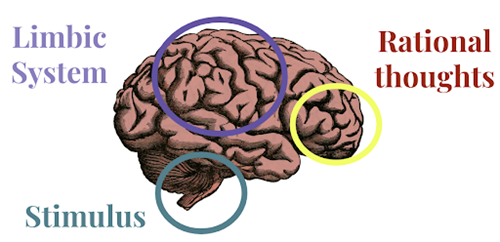Using Emotional Intelligence to lead
Heads Up!
This article is several years old now, and much has happened since then, so please keep that in mind while reading it.
I had never heard of EI before, and leaving that session I felt like I had gained a superpower, and I know that people of all genders can use EI to inspire people, encourage teams and be fantastic leaders.

I’m an emotional person, and before learning about EI, I always saw this as a personality flaw. I had an image of a great leader as being someone who didn't let their emotions get in the way of decision making. A logical thinker who puts considerable energy into their work. I, on the other hand, tend to put people’s feelings into consideration of most working decisions I make, especially when I am put into a mentoring role. I have strong emotions that do affect the way I work and how I act around my colleagues, friends and family.
Tenille argued during her talk that being in control of your emotions is almost like having a hidden superpower. You can use your emotions to inspire people, encourage your teams and be an amazing leader. Since that day, I have been taking the emotions I had once thought of as a weakness, and turned them into strengths. I’ve become more empathetic and inquisitive in how others feel, creating an environment where team members are more open to talking about their feelings. The benefit of this is that I have a chance to support those feeling down, or encourage positive feelings to create a more motivated and inclusive workforce.
I've also come to believe that EI is a soft skill that the tech community could truly benefit from. There’s a lot of pressure on us to work at a fast pace, hit deadlines, keep up with the latest technologies whilst also maintain healthy working relationships with co-workers and clients. Tech is notoriously stress inducing and I can’t see that changing soon - however I do think being more emotionally aware can make it easier in ourselves. By being more aware of your emotions, you can become more empathetic, social, motivated and self-aware.
So, what is Emotional Intelligence?
Emotional intelligence is the awareness and control of your emotions, and an additional awareness of the emotions of others.
If you think of IQ, and how it traditionally measures how academic and cognitively intelligent someone is with a numbered score, EI is a way of measuring how well you can manage your emotions. Unlike IQ, however, EI is a skill that you can constantly develop and get better with. Even if you don’t consider yourself to be someone who manages their emotions as effectively as you’d like, you can practice and get better, and use this skill to help you succeed in leadership.
EI is also unlike IQ in that anyone can have high EI. Completely distinct from IQ, one might have high IQ and low EI, vice versa or equal quantities of both. One of the common misconceptions is that EI is relative to personality, but this is not true. In comparison, your personality remains largely fixed - a crystallised and unchangeable part of yourself - whereas EI is a skill that can be improved upon.
Knowing that we can train our brain to be more emotionally aware, we know that personality and emotional responses are results of brain activity. Take, for example, Phineas Gage, whose infamous encounter with a tamping iron sparked two centuries of discussion on personality and brain activity.

Phineas Gage was a railroad worker in Vermont, and probably the most famous man to survive a traumatic brain injury. They say that Phineas was a reliable, intelligent, calm and collected man and knew exactly how to work under pressure. A true team player.
Phineas worked on the construction of railway lines, using a tamping iron to blow holes in the rock. He and his team would drill a hole in the rock, put in some gunpowder, fill up the rest of the hole with sand and then with the tamping iron, jam it into the rock. One day, a small distraction caused Phineas to tamp down into a rock that had not been packed with sand. The ensuing explosion fired the tamping iron out of the rock like a rocket and clean through Phineas's head, landing 30ft behind him.
Fortunately for him and this blog post, this didn’t kill Phineas. After a long recovery process, Phineas was generally okay. Walking, talking and carrying around the tamping iron like a trophy.

However, something had changed in Phineas. Although he was still intelligent and capable something was very different about him. He no longer had control of his emotions. He was angry, impulsive and unreliable. Something that wouldn’t have bothered him before, would now cause some kind of rage. A huge difference in the man that was once empathetic, hard working and reliable.
Now, the story of Phineas Gage is a little shaky, but the legend has sparked considerable conversation regarding emotion and brain activity, and the case of Phineas Gage handily illustrates the science that we now know.
Everything that happens in the world around you enters your thought process at the base of the brain as a stimulus. When you listen to someone speak, it goes into your ears, and then straight to the bottom of the brain.
Next, this stimulus travels through the limbic system of your brain - and this is where your emotions are generated.

This part of Phineas’s brain was still intact and he was producing his emotions as normal. But, the part of his brain that was damaged by his accident was the frontal lobe, and this is where your brain rationalises your thoughts. [1] This allows us to assume that if the brain damage Phineas suffered altered his personality, it was because he could no longer rationalise his thoughts.
EI utilises the connection between the limbic system and the rational part of your brain, and your ability to use these two parts of your brain together to be able to process, be aware of, and respond to your emotions. The great thing about EI is that the more you think about your emotions and begin to rationalise them, the neuron pathways between the limbic system and frontal lobe become stronger. Its like strength training, or learning to code - the more you do it, the stronger the ability becomes. EI works in the same way: it becomes easier to be emotionally intelligent the more you practice."
Why is emotional intelligence important in leadership roles?
EI can help you in both the professional and personal capacities of life. People with a high EI are more motivated, which corresponds to being more confident and also allows you to collaborate with others more effectively.
Closer management of your emotions helps with your physical and mental health. If you can manage your stress, you generally are able to sleep and eat better, with positive influences on your overall health. Skills in EI can help you in this.
Similarly, you as a leader can use EI to be a positive influence on your team. You would more clearly see how you're interacting with your team and how that can be improved, encouraging the desired behaviour to reach a goal or a deadline.
According to Daniel Goleman, the American psychologist who helped to popularise emotional intelligence, there are five key elements to being emotionally intelligent:
- Self-awareness
- Self-regulation
- Motivation
- Empathy
- Social skills
Self-awareness
If you’re self-aware, then you are always aware of how you’re feeling and you know how to control how you’re feeling. You more readily understand how your actions affect the people around you, and this is helpful in navigating the impact you have on a team. You can turn a bad situation into a better one. You also know your strengths and your weaknesses, and so you can confidently advise on areas you're an expert in, identifying weaknesses and rallying your team members to help you through them.
You can become more self-aware and heighten your EI in this capacity by slowing down. Take time in assessing situations, how you feel, and then decide on a way to act that helps yourself. Rather than acting on an impulse, you've chosen a better way to react. Say you’re about to agree to work on a new project. Rather than impulsively jumping in, sit back and think about what is required of you in this new project. Are you and your team proficient enough in the tech stack to get straight into it, or will you need to do some investigation? Does it make you feel nervous or confident? Asking yourself these questions and becoming more aware of how you’re going to work on this project could help it go a lot smoother, and result in less stress for yourself in the future.
Self-regulation
Leaders who regulate themselves effectively rarely verbally attack others, make rushed or emotional decisions, stereotype people, or compromise their values. Self-regulation is all about staying in control of your emotions.
Being able to regulate yourself also gives you a sense of self-accountability. Very few of us are able to own up to our mistakes, but for those with high EI in this area, it's easier to right your wrongs rather than pass the blame onto colleagues.
To improve your self-regulation skills, you need to know your values and ethics. If you're comfortable with these, you probably won't have to think twice when making ethical or moral decisions, as you'll be confident you're making the right choice. You can also practise being calm - if you’re in a stressful situation and find yourself lashing out at people or shouting, that’s not good for anyone.
Use breathing exercises, allow yourself to calm down, and then you can make the right decisions with a clear head. Hold yourself accountable and commit yourself to fixing your problems rather than throw them at other people. You’ll be respected and feel better in yourself for doing so
Motivation
Self-motivated leaders hold high standards for themselves and take a lot of pride in their work. Pride in your work motivates others to work toward your high stand - especially if you're their leader. If you’re troubled by staying motivated, it may be time to re-evaluate your job and why you’re doing it. Look at your goals and change them if you’re currently unhappy with your situation. Try and see why you’re unmotivated and try and fix them yourself.
However, it's also important not to get into your own head. Imposter syndrome - a devil on the shoulder of many a tech worker - can quickly demotivate you. You may feel like your accomplishments aren't as valid as someone else's, or that you're a fraud and you don't know what you're doing. It’s easy to feel like this when knowledge becomes outdated quickly, and there’s so much out there you don’t know. Fight imposter syndrome by having peer reviews that ground you, and give someone a chance to highlight your achievements for you. As a leader, you could create a positive and encouraging environment with a team that builds each other up.
Empathy
Having empathy is key to being a good leader. The leaders I have looked up to and respected the most are the ones that have been the most empathetic towards me and have seen me as a human being rather than just another cog in the machine. Having empathy puts you in your team members' shoes. It allows you to help them if they need support, or challenge if you know they need to be pushed a bit further.
You can be empathetic by responding constructively when someone reveals their emotions to you. Rather than brushing off someone's feeling, let people know that you hear them and that you're listening. If a team member is disappointed in themselves you can tell them that you appreciate them and you think they’re doing a great job, and offer constructive advice. If a team member says they think they’re doing great and they’re happy, tell them you’re happy for them too. You can also pay attention to body language - if you’re talking to someone and they say they’re okay, but they have a furrowed brow, are looking to the ground or fidgeting, this is an indication that they are in fact not okay, and gives you an opportunity to try and change that.

This also counts towards your own body language. If you’re displaying yourself as angry with crossed arms, heavy sigh, smashing keyboards, then you’ve let everyone know you’re angry and have set the mood for the day.
Social skill
Social skill is a broad term, but in the context of EI, it means being able to communicate with people, build relationships, boost morale in the team and influence other people’s emotions. For example, if it’s a generally gloomy day in the office, a leader can quickly engage with the team to bring them all up into a good mood, using their high social skills to get the team to where they need to be. If you’re looking to try and improve your social skills, you could try to give praise to people to bring them up, and try to take the initiative in resolving conflict if you can. It’s good to try and consider the best way you want to get your messages across to people, so rather than send a quick email, you could try to go and see that person and have a conversation with them. It’s helpful to try and think before social interactions, to make sure you can get your message across as you intend to. Try to consider what the person may say next, plan conversations in advance and think about cultural barriers.
EI can benefit tech workers in many aspects of their careers. Whether you’re struggling with stress, imposter syndrome or with reaching that next level in your career that would put you in the role of leadership, thinking a little more emotionally might put you there. Regardless, I believe that if we all thought a little more emotionally, we could create a more empathetic, inclusive and positive environment and community to work in.
A big thank you to Nicola Peard for proofreading and other suggestions.
[1] - Thomas C. Neylan, Frontal Lobe Function, The Journal of Neuropsychiatry and Clinical Neuroscience, 1999, https://neuro.psychiatryonline.org/doi/abs/10.1176/jnp.11.2.280